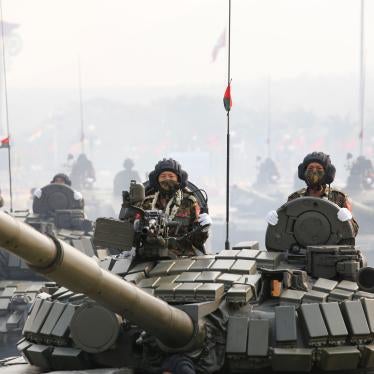"I'm scared," says Krishna as we sit in his modest home in a London suburb.
I did not expect to hear that from a man who fought for the rebel Tamil Tigers in Sri Lanka for more than 10 years, and participated in some of the fiercest battles of that country's civil war.
Krishna (not his real name) was describing the Tamil Tigers' influence over Sri Lankan Tamils living in the UK, and their use of intimidation to stifle any criticism of their human rights abuses in Sri Lanka.
Their control over the diaspora is so extensive, he says, that questioning the Tamil Tigers or their methods is out of the question.
"I cannot open my mouth," he says.
Prior to a ceasefire reached in 2002, the Tamil Tigers (officially known as the Liberation Tigers of Tamil Eelam, or LTTE) fought the Sri Lankan government for nearly two decades, seeking an independent state for Sri Lanka's Tamil minority in the north and east of the country.
The brutal conflict prompted nearly a quarter of Sri Lanka's Tamil population to flee the country - many because of abuses by the Sinhala-dominated government.
The Sri Lankan Tamil diaspora now numbers some 600,000 to 800,000 worldwide, and has become an important source of political and financial support for the Tamil Tigers. Britain, with more than 100,000 Tamils, hosts one of the largest Sri Lankan Tamil communities in the western world.
As a new report by Human Rights Watch documents, the Tamil Tigers regularly approach Tamils abroad to demand funds for their operations, telling them that it is their responsibility as Tamils to support the cause.
By the mid-1990s, some experts estimated that between 80% and 90% of the LTTE's war budget came from overseas, including diaspora contributions. While many Tamils support the Tamil Tigers and give willingly, others are subjected to threats and intimidation.
Krishna, the London Tamil I spoke to, has already made major sacrifices for the Tamil Tigers. Two of his brothers died during the conflict in Sri Lanka. He was wounded in combat.
But when the LTTE came to his door late last year, they wanted more. They wanted funds for what they called "the final war". They told him that if he did not give them money, he would not be able to take his children back to Sri Lanka.
His experience is common among London Tamils. A recent Human Rights Watch investigation documented an aggressive and systematic LTTE fundraising campaign in Britain, Canada and other western countries.
In London, the Tamil Tigers and groups linked to them have pressed individual families to pay them £2,000. Business owners have been asked for amounts ranging from £10,000 to £100,000. Many are told that if they do not pay, they will have "trouble" when they return to Sri Lanka.
Many give without question, motivated by a culture of fear pervading the community. During the four-year ceasefire, the LTTE has killed nearly 200 political opponents and others in Sri Lanka, mostly Tamil, so many Tamils in the west fear for relatives back home.
A Tamil woman living in Canada says: "I have a brother there. I am afraid for him. I will do whatever they ask."
Fear within the diaspora is also fed by intimidation and harassment of Tamil activists and journalists who criticise the Tamil Tigers publicly or are perceived to be anti-LTTE.
Dissident Tamils are subjected to death threats and smear campaigns. A Tamil man in Germany was recently beaten nearly to death for simply organising a memorial service for a college principal killed in Sri Lanka several months before.
Many British Tamils believe that the authorities are not taking intimidation and extortion by the Tamil Tigers seriously.
Fundraising for the LTTE is illegal in Britain because the group is listed as a "terrorist organisation" under the Terrorism Act, but it receives little attention from the police. An inspector with the Metropolitan police told Human Rights Watch: "We know that extortion is going on, but this is not a priority for the British government."
His assessment is borne out by Krishna's experience of calling the local police when the LTTE came to demand funds.
"I told them that they are going to ask for money and I won't give it. There may be trouble," he says. But the police informed him, he says, that unless the LTTE make direct threats to his life or safety, they will not send officers to his house.
The British government has a responsibility to ensure the safety of all residents and protect their rights to live and express themselves without fear. A proper response would entail active investigations of violence, intimidation and extortion linked to the Tamil Tigers; prosecutions where warranted; public education campaigns in the Tamil community to publicise relevant laws and avenues of complaint; and systematic efforts to educate the police and other authorities regarding the realities facing British Tamils.
Britain's response - or lack of one - to the fears within the Sri Lankan Tamil community cuts to the heart of what it means to foster a multicultural society. These issues cannot be dismissed as just a Tamil problem. This is a British problem, and it demands a serious response.








